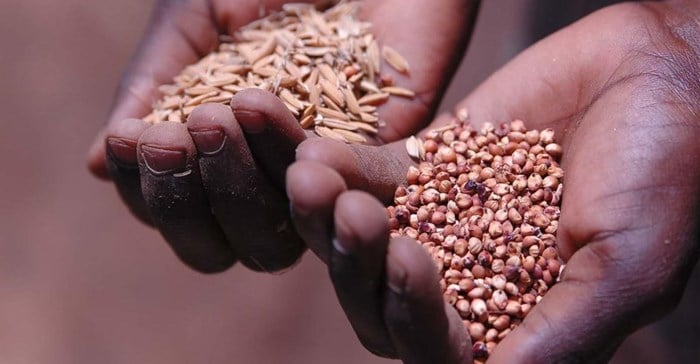
In his address on Tuesday (22 August) he said Russia has pledged to provide six African countries with 25- to 50,000 tonnes of grain with free delivery.
“We are consistently increasing supplies of fuel- agricultural products and fertilizers to countries of the Global South making a significant contribution to strengthening global food- and energy security, and are addressing huge humanitarian issues and fighting hunger and poverty.”
With this aim, Putin said Russia is creating new sea- and land transport routes, an objective that has become a shared priority in co-operation between Brics countries.
“In this context, the Brics Business Council's initiative is set to elaborate more on all the logistics solutions and to develop railway and transport corridors. Our flagship project includes the Northern Sea Route and the new international North-South transport corridor.
“These two major transport routes aim to provide the shortest and most cost effective trade routes that will connect Russian ports of the northern seas and the Baltic and open ocean terminals in the Persian Gulf of the Aden ocean, thereby providing opportunities to create cargo transportation between Eurasian and African countries. Besides, this will certainly give impetus to develop new industrial trade and logistics facilities along those routes.”
Putin’s announcement comes on the back of his decision to terminate Russia’s involvement in the Black Sea Grain initiative.
The UN-brokered accord - that facilitated the export of more than 30 million tonnes of Ukrainian grain to global markets via three Black Sea ports - expired on 17 July.
The Black Sea Grain Initiative involved Russia lifting its blockade of Ukraine's Black Sea ports to allow Ukrainian grain exports to reach world markets. It is said to have alleviated food prices and addressed food-security concerns, particularly in Africa.
“I have repeatedly said that our country has the capacity to replace Ukraine both commercially and in terms of providing free aid to needy countries especially since our harvest is again expected to be perfect,” Putin said.
Providing up to 50,000 tonnes of grain to Burkina Faso, Zimbabwe, Mali, Somalia, the Central African Republic and Eritrea - each with free delivery - is the first step to actualising this goal, he affirmed.
“This is an important part of the economic agenda of the Global Five.”
The President of Russia, HE Vladimir Putin participated in this leaders Retreat Session virtually. #BRICSSummit2023 https://t.co/JcOPfZwJ62 pic.twitter.com/xsHoSghC9b
— Clayson Monyela (@ClaysonMonyela) August 23, 2023
Putin's decision comes subsequent to heavy sanctions imposed on Russia. While Russia's grain and fertilizer exports are not subject to Western sanctions, Putin said restrictions on payments, logistics and insurance have been a barrier to shipments of food to Africa..
It is having humanitarian consequences for the least developed countries, Putin stressed.
“Russia is being deliberately obstructed in the supply of grain and goods abroad and at the same time being frantically blamed for the current crisis situation in the world markets."
But many critics are at odds with Putin, among them the Ukrainian Grain Association (UGA), which has approximated that from the commencement of the full-scale invasion of Ukraine up to May 2023, approximately 4 million tonnes of grain has been illicitly taken by the Russians from Ukraine. The claim was made by UGA president Mykola Horbachov in May this year.
"For stolen grain, ships come like criminals, at night: they turn off GPS trackers, pass by as if invisible, load [the grain], and then go in an unknown direction. However, the marine traffic program allows you to track where these ships are headed, how much and what they are transporting. All these facts are recorded by Ukraine," he said.
Some may argue that most of the grain Russia pilfered is being sold in the market, where prices have surged due to the blockade on Ukraine's wheat exports. Meanwhile, a fraction of this stolen grain is being contributed to six African nations.
The Brics leaders are set to discuss Putin's plans behind closed doors during the Brics2023 summit.
At the Russia-Africa summit, held at St. Petersburg on 27 and 28 July, Putin repudiated SA President Cyril Ramaphosa's plea - and the appeals of African leaders - to revive the Black Sea Grain initiative.
At the meeting Ramaphosa said, "We would like the Black Sea to be opened to the world market. And we… are not coming here to plead for donations for the African continent…"
United Nations Secretary-General Antonio Guterres also recently cautioned that addressing the significant consequences of the termination of the Black Sea Grain initiative requires more than just a few donations.
Global wheat prices spiked about 10% 10 days following Russia exiting the agreement.
"It is clear that when taking out of the market millions and millions of tonnes of grains it is clear that ... will lead to higher prices," Guterres said. "So it's not with a handful of donations to some countries that we correct this dramatic impact that affects everybody, everywhere."
Last year trade in agricultural projects between Russia and the African state grew at 10% and amounted to $6.7bn. From January to June this year, it increased by another record 60%.
In 2022 Ukraine's harvest totalled 55 million tonnes, while Russia's contribution surpassed that of Ukraine, harvesting 156 million tonnes of grain in the same year.
“Our country is and will remain the responsible supplier of foods to the African continent,” Putin said.
Katja Hamilton is at the Brics Summit this week in Johannesburg, reporting live for Bizcommunity.